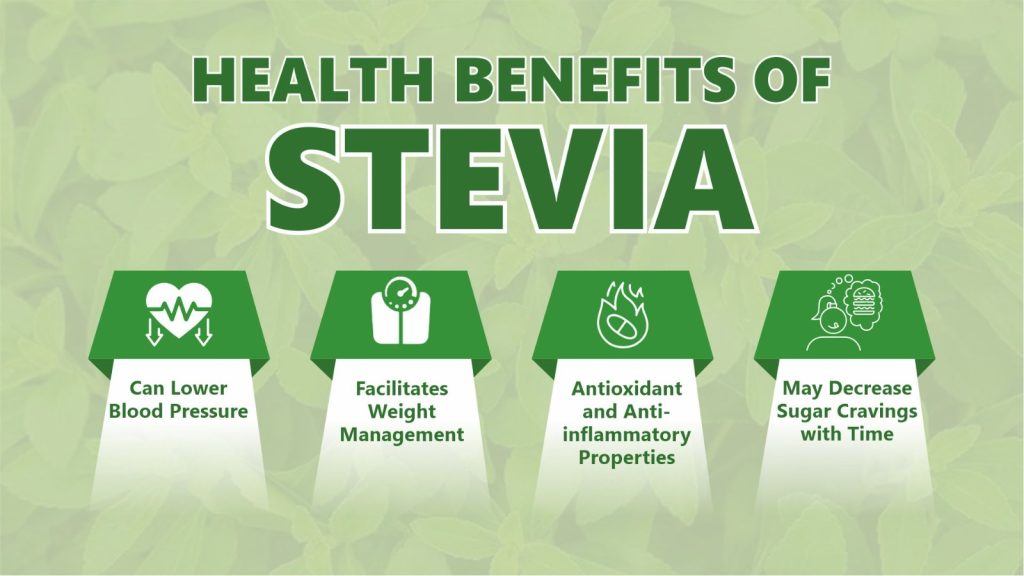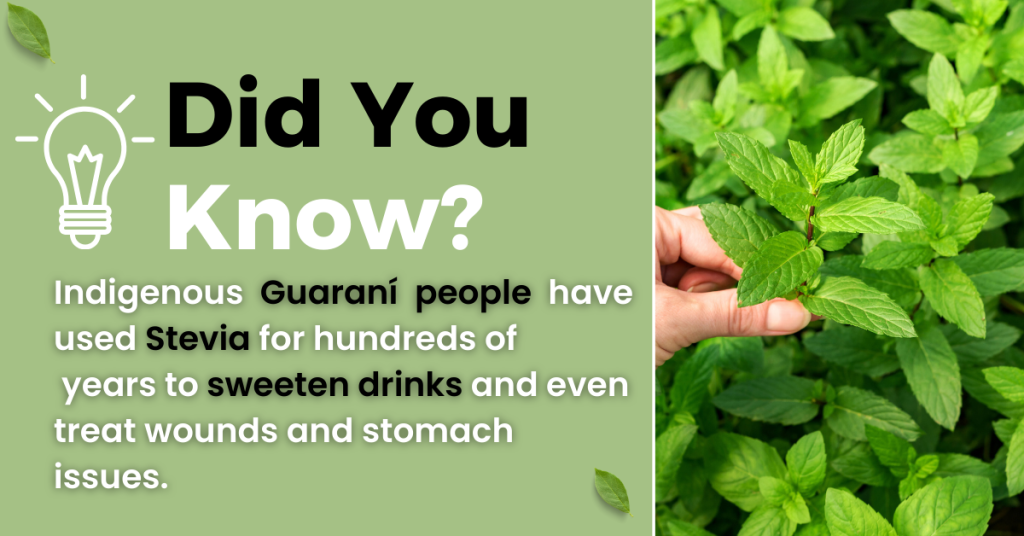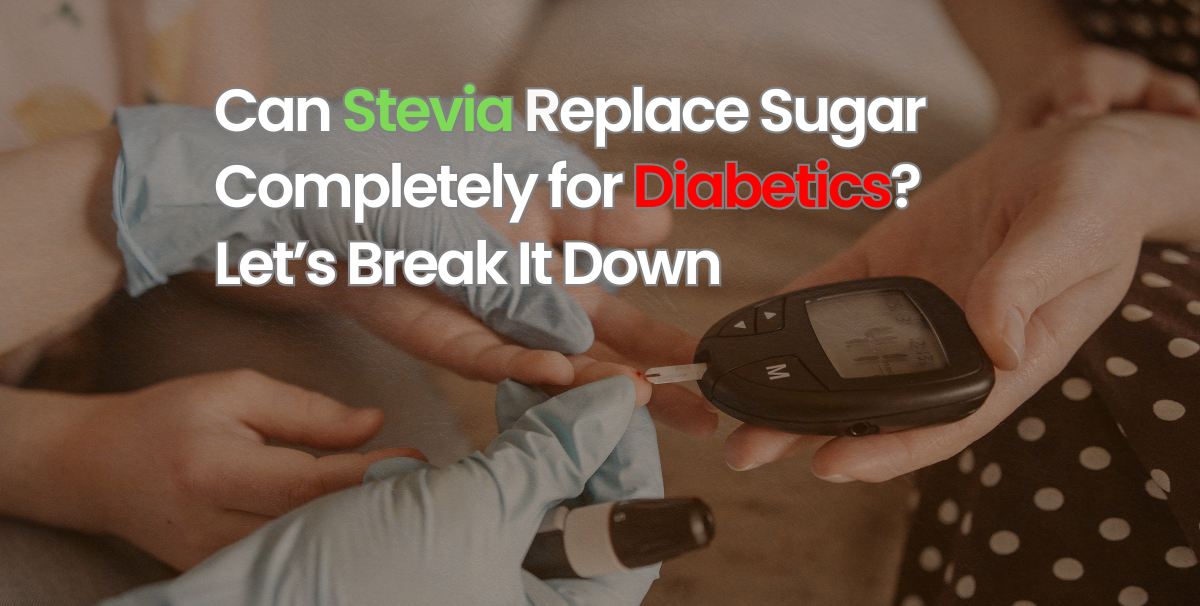Living with diabetes often means reshaping your entire relationship with food, especially anything sweet. Whether you’re newly diagnosed or a long-time warrior of blood sugar management, chances are you’ve asked: “Is there a safe way to enjoy sweet things again?”
Enter stevia—a natural, zero-calorie sweetener that’s making waves in the diabetic community. But can stevia really replace sugar altogether for diabetics? Let’s break it down, myth-bust the confusion, and get to the sweet truth.
What is Stevia?
Stevia is a plant sweetener derived from the leaves of Stevia rebaudiana, a native South American plant. It has been used for centuries by the local people to sweeten medicine and treatments. Nowadays, it is sold in its powder, drops, and granules form across the globe.
Unlike ordinary sugar, there are no calories or carbohydrates in stevia, making it a leading choice for diabetics looking to manage blood sugar spikes.
How Stevia Works in the Body
Effect on Blood Sugar and Insulin Response
The glory of stevia is that your body responds to it differently. It doesn’t increase insulin or blood sugar levels, which is very important to diabetics who are controlling the disease.
Sugar, in contrast, inundates the bloodstream with glucose. Stevia goes through the digestive tract largely unchanged.
Is Stevia Metabolized by the Body?
Not at all. Your body does not break down steviol glycosides (the sweet substances in stevia) for fuel. They move through your body and leave with little to no interaction. That means zero effect on glycemic load.
Is Stevia Safe for Diabetics?
Yes, and it’s not a rumor. Regulatory agencies such as the FDA, the World Health Organization (WHO) and the European Food Safety Agency (EFSA) have all designated high-purity stevia extracts as safe.
Type 1 and type 2 diabetics can both use stevia safely. Just be sure it’s pure stevia, not a mixture loaded with sugar alcohols or other sweeteners.
Stevia vs Sugar: Which is Better for Blood Sugar Control?
| FEATURE | SUGAR | STEVIA |
| CALORIES | 16 per tsp | 0 |
| GLYCEMIC INDEX | 60-65 | 0 |
| IMPACT ON BLOOD SUGAR | High | None |
| DENTAL HEALTH RISK | Yes | No |
Verdict?
Stevia wins by a landslide.
Stevia vs Artificial Sweeteners: Which Should Diabetics Choose?
Common artificial sweeteners such as aspartame, saccharin, and sucralose contain no calories but come with a price. Some have been associated with alterations in the gut microbiome and potential long-term health consequences.
Stevia, however, is a natural, plant-based, minimally processed sweetener that’s safer and healthier for long-term diabetic consumption.
How Much Stevia Can a Diabetic Consume Daily?

The World Health Organization provides an Acceptable Daily Intake (ADI) of 4 mg of stevia glycosides per kilogram body weight. If you weigh 154 lbs or 70 kg, therefore, you can enjoy safely up to 280 mg per day, equivalent to many servings based on the company’s brand.
Can Diabetics Use Stevia in Cooking and Baking?
Absolutely! Stevia is heat-stable up to 392°F (200°C), which means you can use it for baking,
boiling, or anything in between.
Popular Recipes Using Stevia:
- Stevia-sweetened chocolate brownies
- Diabetic-friendly vanilla cupcakes
- Homemade lemonade with liquid stevia
- Low-carb chia seed pudding
Pro tip: Use stevia conversion charts to get the right sugar-to-stevia ratio in your recipes
Health Benefits of Stevia Beyond Sweetness
Stevia not only serves sugar cravings—it might have an even larger role to play in overall health, particularly for diabetics.

1. Can Lower Blood Pressure
Some clinical trials indicate that large amounts of stevia can lower systolic and diastolic blood pressure. This is a big plus for diabetics, as elevated blood pressure is a frequent comorbidity. The plant has compounds that open the blood vessels and enhance the excretion of sodium, both beneficial for hypertension.
2. Facilitates Weight Management
Since it is calorie-free, stevia facilitates a lower-calorie lifestyle, which aids in weight loss or weight maintenance. Excess weight is a significant risk factor for type 2 diabetes. Replacing sugar with stevia in even one cup of coffee daily can cut thousands of calories annually. This makes stevia and weight management a powerful duo for those looking to improve their overall health and reduce diabetes risk..
3. Antioxidant and Anti-inflammatory Properties
The steviol glycosides in stevia have antioxidant activity, protecting cells from oxidative stress damage. For people with diabetes, this may be a reduced risk for complications involving nerve damage or cardiovascular problems.
4. May Decrease Sugar Cravings with Time
Stevia can also retrain your taste buds. Unlike artificial sweeteners, which sometimes create a “sweet tooth,” some users say that stevia actually assists them in decreasing overall sweet cravings, resulting in improved long-term eating habits.
Can Stevia Replace Sugar for Diabetics in Their Diet Entirely?
In most cases, yes.
You can fully replace sugar with stevia in drinks, cereals, desserts, and even savory sauces. When it comes to using Stevia to replace sugar for diabetics, it’s a smart and healthier choice. However, some products may not taste exactly like sugar, especially if you’re new to stevia. Start small and adjust to taste as your palate adapts to this natural, low-calorie alternative.
Is it Safe to Use Stevia Every Day if You Have Diabetes?
Daily consumption of stevia is safe, as long as you stay within the recommended limits. Most people don’t even come close to the ADI, especially when using it sparingly in coffee or baking.
Risks and Precautions When Using Stevia
- Always check the ingredient list: Some stevia products include maltodextrin or dextrose, simple sugars that can spike blood glucose.
- Avoid blends that contain sugar alcohols if you have digestive sensitivities.
- As with anything, moderation is key.
Expert Opinions
Most experts agree: stevia is a safe and effective sugar substitute for diabetes, and Stevia can replace sugar completely for Diabetics. Some even recommend it over artificial sweeteners because of its natural source and additional health benefits.
Conclusion
You don’t have to give up on sweetness when managing diabetes—it’s just a matter of selecting the right type. And that’s where stevia comes in, providing a revolutionary alternative that is natural, safe, and effective.
In the course of this article, we’ve revealed that stevia for diabetics is not hype—it’s science-backed, health-experts-endorsed, and adopted by people worldwide. Whether you want a healthier morning coffee, baking substitutes, or a no-guilt means to satisfy your sugar cravings, stevia is the solution.
But what really makes stevia special is that it can give you sweet pleasure without the spike. Zero calories, zero carbs, and a zero glycemic index mean that it lets you have your cake and eat it too, without upsetting your blood sugar control. That’s not victory—triumph.”.
The reality is, you can indulge in the flavors you adore without sacrificing your health. By making the easy switch to stevia, you’re not only reducing sugar, you’re taking charge of better blood sugar management, weight control, and overall well-being.
So go ahead—sweeten your life the smarter way. Stevia isn’t just a sugar substitute, it’s a sustainable lifestyle upgrade for anyone living with diabetes. Choose Zindagi Stevia and take every choice as a step toward better health.
Did You Know This About Stevia?
Indigenous Guaraní people have used stevia for hundreds of years to sweeten drinks and even treat wounds and stomach issues

Frequently Asked Questions (FAQs)
Q1. Can stevia replace sugar in a diabetic diet?
A. Yes, stevia can be used as a complete sugar substitute, especially in drinks and light cooking.
Q2. How much stevia is too much?
A. Stick to under 4 mg per kg of body weight per day, as per WHO guidelines.
Q3. Is stevia better than artificial sweeteners?
A. Yes. It’s natural, calorie-free, and doesn’t have the same health concerns tied to synthetic
options.
Q4. Is stevia okay for type 2 diabetics?
A. Absolutely. It’s especially beneficial for managing insulin sensitivity and reducing sugar intake.
Q5. What’s the best time to consume stevia?
A. Use it anytime you’d normally reach for sugar—in your morning coffee, post-meal dessert, or cooking.
Q6. Can children with diabetes use stevia?
A. Yes, in appropriate amounts based on their weight and under medical guidance






